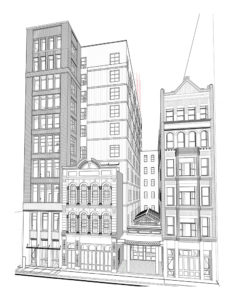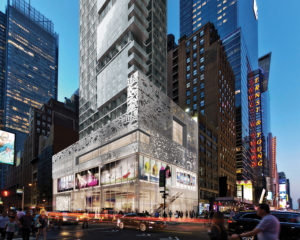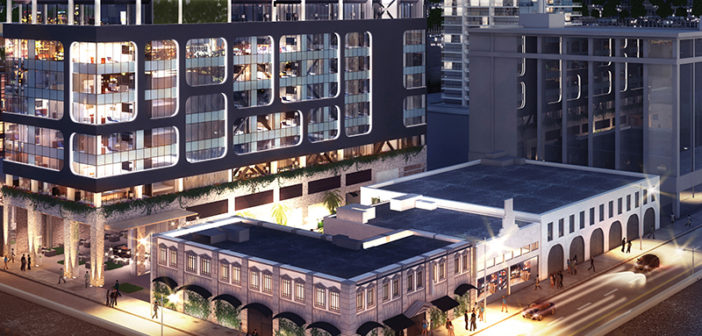NEW YORK—With $1.5 billion in new hotel development, Dream Hotel Group’s Dream brand has plans to double in size by 2019.
With a presence in Miami, Bangkok and Phuket, as well as two properties in New York and one slated to open in Hollywood, CA, later this year, future Dream properties are being developed in Nashville, TN; Dallas; Palm Springs, CA; New York’s Times Square; and Long Island City, NY, as well as Doha, Qatar, marking the brand’s debut in the Middle East.
Jay Stein, CEO, Dream Hotel Group, said the brand plans to grow much more. “We’ve been throwing around numbers of around 25 perhaps in the U.S., give or take five or 10, one way or the other. And internationally, two to three times that, so maybe in the 50-70 range. That’s where we see the sweet spot for Dream,” he said.
Stein noted that Dream has evolved over the years from a one-off hotel to a brand. “When we started Dream, we didn’t envision it to be a brand,” he explained. “After the recession, we looked at an opportunity to really go head-to-head with the best lifestyle hotels in any particular market.”
Stein turned to the current pipeline. “In Hollywood, the views are just spectacular,” he said. “It’s very much a sister property with Dream Downtown [in New York].” The 179-key property has outdoor space on the rooftop and the ground floor, and the elevators that go to the rooftop bar sit on the exterior of the building. “They’re surrounded by restaurants and bars—this tremendous energy, this perfect L.A. scene,” he said. And while F&B operations is integral to all Dream hotels, Stein noted that the company is contemplating a live music venue in Nashville, a first for the brand “but perfect for Nashville.” As for Palm Springs, Stein said it wasn’t suburban “but truly downtown, so you’ll get all of that original vibe of what Palm Springs was and that current feeling of hipsters…looking for hotels like ours.

The 169-key Dream Nashville, expected to open in mid-2018, will be developed by locally owned 4PANT LLC, which is led by Royal Investments and City Development.
“Right now, we’re looking to get into the correct markets, starting to fill in the middle of the country,” continued Stein, pointing to the projects in Dallas and Nashville. “We’re very active now in Chicago, we’re active in Austin, trying to find deals to execute with other partners. We’re looking for opportunities in key cities.”
In addition to doubling the overall portfolio, Dream will be doubling its portfolio in New York. Brendan McNamara, EVP, marketing, communications & product development, said that the brand doesn’t need to worry about overexposure in a city like NYC. “Within New York, there are so many micro markets that the way we look at the properties when we develop them is not only where they’re sitting, but also what the building was to begin with,” he said, noting that these micro markets allow Dream to create distinct properties that fit within the brand’s tenets. “The experience at Dream Midtown is very different from what you’ll experience at Dream Downtown and that’s purposeful because the core traveler experience is different,” he said. “We have a heavier mix of more normative corporate in Midtown than we do in Meatpacking. The nightlife experience varies slightly. We know, for instance, people going out will be a bit earlier in the Midtown sector than in Meatpacking. As we look at these other markets, like Times Square and Long Island City, we really look carefully at what the local community is saying they want. We know that if the F&B venue is appealing to the local community, then it’s going to be appealing to the guest coming through the doors.”
Stein added there are other cities that could see multiple Dream properties. “There are a couple of cities where it would make sense, but not that many,” he said. For instance, Los Angeles. “We have a couple of other sites that we’re getting pretty close on,” he said. David Kuperberg, chief development officer, Dream Hotel Group, added that Miami is another. “You have South Beach and then Downtown Miami, which are completely different markets,” he said.
Turning to the planned property in Qatar, Stein said Dream had originally looked at Dubai. “We were looking at a site there and as it started to move forward, the project ended up not being correct for the Dream brand and we bowed out,” he explained. Dream was then introduced to its developers in Doha, and it took a year of discussions to make sure the project was the right fit on both sides.
“The Middle East is an ever-changing market. There is some great design, great demand for hotel rooms,” said Stein. “Doha is a world-class city with world class events, and we are committed to the Middle East and looking for more opportunities.”
Both Stein and McNamara noted there are cultural sensitivities that have to be addressed to adapt the Dream brand to the Middle East—different trends with days of the week and how business is done, prayer rooms in hotels, space where you can serve liquor, etc.—but, McNamara said, “One thing that isn’t different, at least in the markets we’ve encountered, is there’s a thirst for this type of environment that we’re calling lifestyle. It just looks a little different everywhere you go.”

The first of two planned openings in NYC, the 239-key Dream Times Square will be developed by SoHo Properties. It is expected to open in the second half of 2018.
While supply growth is an overall industry concern, the executives weren’t worried as Dream executes its development plan. Part of this, Kuperberg said, is because of all of the M&A activity in the industry. “People constantly ask me if it’s an oversaturated market with so many lifestyle brands. With the recent acquisition of Kimpton and many mergers going on with Commune and Morgans, from the development side, we’re actually finding less and less competition,” he explained. “For development partners really looking for a true lifestyle partner, and an independent one, there are very few of us left.”
The executives also noted that because Dream is meant for gateway cities and the envelope that can hold a Dream is so specific—at least 150 keys and the ability to support a minimum of four or five F&B outlets—the brand is also helping to develop the company’s Time brand, which currently has two properties open in New York and Nyack, NY. McNamara noted, “Many developers want to do a Dream property and they have a fantastic location, but the building envelope couldn’t support four to six food & beverage outlets, and that is a core part of the Dream brand. The Time is our counterbalance to that—a good lifestyle offering that only really requires one solid restaurant and one solid lounge and a very refined perspective on design. Part of the reason we developed that brand was in response to what we were seeing from developers and the opportunities they had that Dream wouldn’t necessarily fit into.”
Kuperberg said, “Part of our growth strategy moving forward is around our other brands, Time and Unscripted, as well as The Chatwal. With the opening of the Time Nyack and the recently announced Unscripted Durham deal, our other brands are starting to grow and we see that as a huge potential moving forward.” Kuperberg said Time enables the brand to enter secondary cities—“We were looking in Los Angeles, Hollywood for Dream, but as you look at some of the secondary cities out there, like a Long Beach or parts of San Diego, that would be perfect for a Time,” he said—and Unscripted has the widest net. Added McNamara, “Unscripted has become more of a conversion plan for us. As we look at especially secondary markets where there are properties in a prime location that have been underleveraged for years, it’s a really good play for us to use a critical design eye and go in, and see where we can lift.”
Turning back to the Dream brand, Stein noted the company’s approach to growth has changed over the years; rather than own and manage everything, the company looks to work with other developers. “Of course, we will do some sliver equity or take a larger piece in certain deals and, in other deals, we may take the forward position as in the Dream Dallas. We’re developing that hotel ourselves,” he explained. “We’ll also look at other key markets, such as San Francisco and London, to take that lead role.” HB


